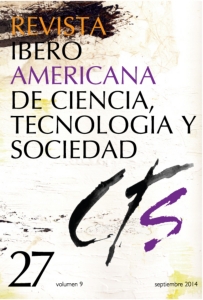Calidad y relevancia en la investigación universitaria
apuntes para avanzar hacia su convergencia
DOI:
https://doi.org/10.52712/issn.1850-0013-580Palavras-chave:
universidad, investigación académica, calidad, relevanciaResumo
Este trabajo discute los conceptos de relevancia y calidad de la investigación universitaria, mostrando sus diversas acepciones y cómo estas se insertan en concepciones de universidad y también de desarrollo. Se detiene en la íntima asociación entre relevancia y demanda de conocimientos y las consecuencias que de ella se derivan. Describe dos instrumentos de política universitaria que buscan articular relevancia y calidad y muestran cómo opera la construcción simultánea de demanda de conocimientos y relevancia académica y social de la investigación.
Downloads
Referências
ALZUGARAY, S., BIANCO, M., GOÑI, M., MEDEROS, L., SUTZ, J. Y ROBAINA, S. (2014): “Investigación e innovación orientadas a la inclusión social: análisis reflexivo de un proceso experimental” en M. Bianco y J. Sutz (comps.): Veinte años de políticas de investigación universitaria: aciertos, dudas, aprendizajes, Montevideo, Trilce-CSIC, pp. 187-208.
ALZUGARAY, S., MEDEROS, L. Y SUTZ, J. (2012): “Building Bridges: Social Inclusion Problems as Research and Innovation Issues”, Review of Policy Research, vol. 29, nº 6, pp. 776-796.
AVALOS, I. (1997) “El CONICYT: Casa de pares e impares (o cómo no hay ideas equivocadas sino extemporáneas)”, en J. Sutz (ed.): Innovación y Desarrollo en América Latina, CLACSO, Caracas, Editorial Nueva Sociedad-Agencia Española de Cooperación Internacional, pp. 151-162.
AROCENA, R., BORTAGARAY, I. Y SUTZ, J. (2008): Universidad para el Desarrollo, Montevideo.
AROCENA, R. Y SUTZ, R. (2009): “Sistemas de innovación e inclusión social” Pensamiento Iberoamericano, pp. 99-120.
COHANOFF, C., MEDEROS, L. Y SIMÓN, L. (2014): “La universidad vinculada y sus desafíos”, en M. Bianco y J. Sutz (comps.): Veinte años de políticas de investigación universitaria: aciertos, dudas, aprendizajes, Montevideo, Trilce-CSIC, pp. 85-106.
ETZKOWITZ, H., WEBSTER, A., GEBHARDT, CH. y CANTISANO, B. (2000): “The future of the university and the university of the future: evolution of ivory tower to entrepreneurial paradigm”, Research Policy, vol. 29, nº 2, pp. 313-330.
FRENK, J. (1992): “Balancing relevance and excellence: organizational responses to link research with decision making”, Soc. Sci. Med., vol. 35, nº 11, pp. 1397-1404.
FUNTOWICZ, S. y RAVETZ, J. (1993): “Science for the post-normal age”, Futures, vol. 25, nº 7, pp. 739-755.
GIBBONS, M., LIMOGES, C., NOWOTNY, H., SCHWARTZMAN, S., SCOTT, P. y
TROW, M. (1994): The New Production of Knowledge, Londres, Sage.
GORANSSON, B. Y BRUNDENIUS, C. (2011): Universities in Transition. The changing role and challenges for academic institutions, Nueva York, IDRC-CIID-Springer.
JASANOFF, S. (1990): The Fifth Branch: science advisers as policy makers, Boston, Harvard University Press.
HERRERA, A. (1979): Ciencia y Política en América Latina, México D.F., Siglo XXI.
HICKS, D. (2004): “The four literatures of social sciences”, en H. F. Moed et al (eds.):
Handbook of Quantitative Science and Technology Research, Holanda, Kluwer.
LYALL. C., BRUCE, A., TAIT, J. y MEAGHER, L. (2011): Interdisciplinarity Research Journeys. Practical Strategies for Capturing Creativity, Londres, Boombsbury Academic.
LUNDVALL, B. A. (2010): “Postcript”, en B. A. Lundvall (ed.): National Systems of
Innovation. Towards a Theory of Innovation and Interactive Learning, Londres, The
Anthem Other Cannon Series, Anthem Press.
MERTON, R. (1977): La sociología de la ciencia: investigaciones teóricas y empíricas, Madrid, Alianza Editorial.
MOKYR, J. (2002): The Gifts of Athena: Historical Origins of the Knowledge Economy, Princeton University Press.
OCED (2013): Science, technology and industry scoreboard. Innovation for growth, París.
NELSON, R. (2003): “The Market Economy, and the Scientific Commons”, LEM Working Papers, Pisa.
NORTH, D. C. (2005): Understanding the Process of Economic Change, Princeton University Press.
NUTLEY S., WALTER, I. y DAVIES, H. T. O. (2007): Using evidence: how research can inform public services, Bristol, The Policy Press.
PIKETTY, T. (2014): Capital in the 21th century, Cambridge, Mass: Harvard University Press.
RODRIK, D. (2007): One Economics, Many Recipes: Globalization, Institutions, and Economic Growth, Princeton University Press.
SLAUGHTER, S. y RHOADES, G. (2004): Academic Capitalism and the New Economy: Markets, State and Higher Education, Baltimore, The Johns Hopkins University Press.
THE GUARDIAN (2013): “Nobel winner declares boycott of top science journals”. Disponible en: http://www.theguardian.com/science/2013/dec/09/nobel-winner- boycott-science-journals. Último acceso en julio de 2014.
THOMPSON KLEIN, J. (2006): “Afterword: the emergent literature on interdisciplinary and transdisciplinary research evaluation”, Research Evaluation, vol. 15, nº 1, pp. 75- 80.
TILLY, C. (2005): Identities, Boundaries, and Social Ties, Boulder, Paradigm Publishers.
WEBER, M. (1993): Basic Concepts in Sociology, New York, Citadel Press.
ZIMAN, J. (2002): Real Science: What It Is and What It Means, Cambridge University Press.
Downloads
Publicado
Como Citar
Edição
Seção
Licença
Copyright (c) 2024 CC Attribution 4.0

Este trabalho está licenciado sob uma licença Creative Commons Attribution 4.0 International License.
Todas os números de CTS e seus artigos individuais estão sob uma licença CC-BY.
Desde 2007, a CTS proporciona acesso livre, aberto e gratuito a todos seus conteúdos, incluídos o arquivo completo da edição quadrimestral e os diversos produtos apresentados na plataforma eletrônica. Esta decisão é baseada no entendimento de que fornecer acesso livre aos materiais publicados ajuda a ter uma maior e melhor troca de conhecimentos.
Por sua vez, em se tratando da edição quadrimestral, a revista permite aos repositórios institucionais e temáticos, bem como aos sites pessoais, o autoarquivo dos artigos na versão post-print ou versão editorial, logo após da publicação da versão definitiva de cada número e sob a condição de incorporar ao autoarquivo um link direcionado à fonte original.











